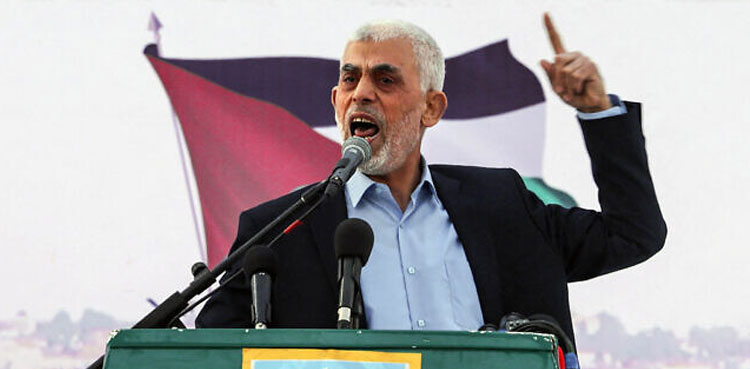
[ad_1]
For one Gazan father, Yahya Sinwar’s death in battle trying to beat back a drone with a stick was “how heroes die”, while for others it was an example for future generations even as some lamented the ruinous cost of the war he sparked with Israel.
Yahya Sinwar was killed on Wednesday in a gunfight with Israeli forces after a year-long manhunt, and his death was announced on Thursday.
Israeli media described him as dying “like a Gaza dog” and many western nations said his death may have removed a key hurdle to reaching a ceasefire.
But the video of him masked and mortally wounded in a shell-smashed apartment trying to hurl a stick at the drone filming him inspired pride among Palestinians.
“He died wearing a military vest, fighting with a rifle and grenades, and when he was wounded and was bleeding he fought with a stick. This is how heroes die,” said Adel Rajab, 60, a father of two in Gaza.
“I have watched the video 30 times since last night, there is no better way to die,” said Ali, a 30-year-old taxi driver in Gaza.
“I will make this video a daily duty to watch for my sons, and my grandsons in the future,” said the father of two.
The attack Sinwar planned on Israeli communities a year ago killed around 1,200 people, mostly civilians, with another 253 dragged back to Gaza as hostages, according to Israeli tallies.
Israel’s subsequent war has devastated Gaza, killing more than 42,000 Palestinians, with another 10,000 uncounted dead thought to lie under the rubble, say Gaza health authorities.
Yahya Sinwar’s own words in previous speeches, saying he would rather die at Israel’s hands than from a heart attack or car accident, have been repeatedly shared by Palestinians online.
“The best gift the enemy and the occupation can offer me is to assassinate me and that I go as a martyr at their hands,” he had said.
RECRUITING TOOL
Now some Palestinians are wondering whether Israel will regret allowing the fulfilment of that wish to be broadcast as a potential recruiting tool for an organisation it has sworn to destroy.
“They said he was hiding inside the tunnels. They said he was keeping Israeli prisoners next to him to save his life. Yesterday we saw that he was hunting down Israeli soldiers in Rafah, where the occupation has been operating since May,” said Rasha, a displaced 42-year-old mother of four children.
“This is how leaders go, with a rifle in the hand. I supported Sinwar as a leader and today I am proud of him as a martyr,” she added.
A poll in September showed a majority of Gazans thought the attack was the wrong decision and a growing number of Palestinians have questioned Sinwar’s willingness to launch a war that has caused them so much suffering.
Rajab, who praised Yahya Sinwar’s death as heroic, said he had not supported the Oct. 7 attacks, believing Palestinians were not prepared for all-out war with Israel. But he said the manner of his death “made me proud as a Palestinian”.
In both Gaza and the West Bank, where Hamas also has significant support and where fighting between Israeli occupying forces and Palestinians has increased over the past year, people wondered whether Sinwar’s death would hasten the war’s end.
In Hebron, a flashpoint West Bank city, Ala’a Hashalmoon said killing Sinwar would not mean a more conciliatory leader. “What I can figure out is that who ever dies, there is someone who replaces him is more stubborn,” he said.
And in Ramallah, Murad Omar, 54, said little would change on the ground. “The war will continue and it seems it won’t end soon,” he said.
[ad_2]
Source link





